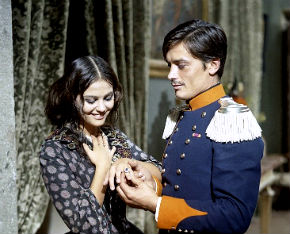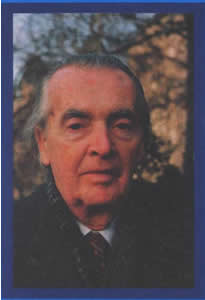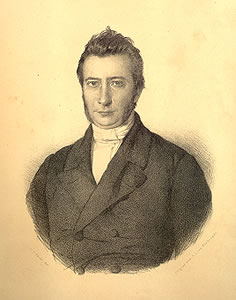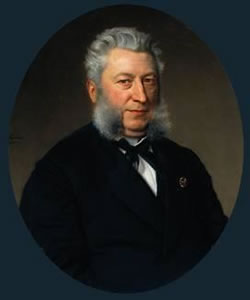De Duits- Hongaarse schrijfster en beeldend kunstenares Christa Winsloe werd geboren in Darmstadt op 23 december 1888. Zie ook alle tags voor Christa Winsloe op dit blog.
Uit: Das Mädchen Manuela (Vertaald door Ruth Baumgarten und Karsten Witte)
„Elisabeth von Bernburg war die Tochter eines hohen Offiziers, wie Fräulein von Kesten, wie fast alle Erzieherinnen der Anstalt. Sie war achtundzwanzig Jahre alt und von diesen achtundzwanzig Jahren nun schon fünf Jahre im Stift, nachdem, wie man munkelte, ihre Verlobung mit einem jungen Dragonerleutnant zurückgegangen war, der Kühle und heftigen seelischen Abwehr des jungen Mädchens wegen, die den Leutnant veranlaßt hatten, kurz vor der Hochzeit die Verbindung zu lösen. Andere wieder wollten wissen, daß Fräulein von Bernburg selbst es gewesen war, die ihrem Verlobten erklärt hatte, sie könne ihn nicht und überhaupt niemals einen Mann heiraten. Diese Äußerung sollte ungeheuer viel Staub aufgewirbelt und zu den verwegensten Deutungen Anlaß gegeben haben. Selbst unter den Zöglingen des Helenenstifts ging sie um; wer sie aufgebracht hatte, wußte niemand so recht genau. Vermutlich aber war es Ilse gewesen, die solche Nachrichten aus den Ferien in Berlin mitbrachte, und zwar geradeswegs von dem sehr jungen zweiten Papa, den sie bekommen hatte, nachdem ihre Mama sich von ihrem Vater getrennt hatte. »Kinder«, sagte sie, »die Bernburgerin … Stellt euch doch vor, daß sie hätte heiraten können und daß sie da lieber hierhergekommen ist! Sie will überhaupt keine eigenen Kinder, soll sie gesagt haben – und dann soll sie den Mann einfach vor die Brust gestoßen haben, als er sie küssen wollte.« Oda und Mia sahen einander an und lachten ihr nicht ganz sauberes Lachen. Aber Manuela fuhr auf. »Ilse, du sollst nicht immer sagen >die Bernburgerin< -und dann, das sind doch ihre Privatsachen, und keiner weiß doch, wie es wirklich gewesen ist.« »Na, hör mal«, sagte Ilse gekränkt, »ein Dragonerleutnant! Also, so was sollte mir nicht passieren!« Alles lachte, nur Marga zischte: »Ruhe!«, denn sie hörte Fräulein von Kesten draußen leise vorbeischleichen. Manuela blieb nachdenklich. In mehr als einer Nacht, wenn Fräulein von Bernburg das Licht im Schlafsaal gelöscht hatte und rings um sie her das Tuscheln begann und die kleinen elektrischen Taschenlampen unter den Kopfkissen hervorgeholt wurden, lag sie und quälte sich ab mit der Frage, was Fräulein von Bernburg nun wohl tat in ihrem Zimmer? Ob sie gern hier war? Ob sie sich nicht doch manchmal sehnte, einen Mann und Kinder zu haben? – Kinder zu haben – ja, das dachte auch Manuela sich schön. Einen Mann, nein, das konnte man sich schwer vorstellen – und Fräulein von Bernburg mit einem Mann, das war ein Gedanke, der sich nicht fassen ließ. Miß Evans, die, die hatte ihren Bräutigam irgendwo in England, und sie sparte sich bloß noch etwas, so hieß es, ehe sie heiraten wollte. Das war ganz in der Ordnung, auch Fräulein von Attems konnte man sich vorstellen als eine Gutsfrau, die in Küche und Keller wirtschaftete – aber Fräulein von Bernburg … „
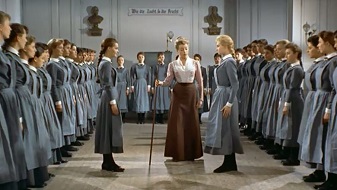
Christa Winsloe (23 december 1888 – 10 juni 1944)
Scene uit de film « Mädchen in Uniform » met o.a. Lilli Palmer en Romy Schneider. De film is gebasseerd op de roman „The Child Manuela“ van Winsloe
De Oostenrijkse expressionistische dichter en schrijver Albert Ehrenstein werd op 23 december 1886 in Wenen geboren. Zie ook alle tags voor Albert Ehrenstein op dit blog.
WOZU
Ich habe gelebt und gelitten
Und habe mir nichts erstritten.
Wer weiß es, wer weiß es
Nach hundert Jahren?
Ich habe gelebt und gelitten
Und hab mir den Tod erstritten.
Wer weiß es, wer weiß es
Nach hundert Jahren?
DER ENGEL
Ein silberstiller Sonnenklang;
Ins Wintertal Lichtstrahl sich schwang
Und stillt mit stummem Saitenspiel
Den wilden Wanderer Ohneziel —
Über graue Wiesen der Grüne schritt:
Tausanft der Erde einziger Engel glitt,
Der Frühling.
Erklangen und schwangen im Blumengeläut
Die Berg und Täler brustweit und breit.
Und Glück und Liebe und Liebe.
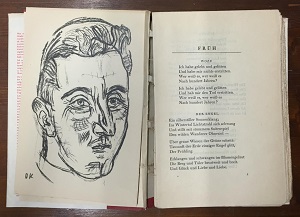
Albert Ehrenstein (23 december 1886 – 8 april 1950)
Portret door Oskar Kokoschka bij bovenstaande gedichten
De Amerikaanse schrijver en komische acteur Harry Shearer werd geboren op 23 december 1943 in Los Angeles. Zie ook alle tags voor Harry Shearer op dit blog.
Uit: Not Enough Indians
“His Hotel Katmandu, opened the previous year, offered a computer-generated Himalayan skyline out of every window and a twice-daily audience with the Dalai Lama for groups of twenty tourists willing to pony up a hun-dred dollars per head. None of them had yet objected that Katmandu was in Nepal while the Dalai Lama came from Tibet. Tony’s previous venture, the Milano, featured a three-fifths-sized replica of the Duomo and slimmed-down versions of famous operas by a company from La Scala. That was part of what so steamed him about Wowosa, as he sat with Serena in Chips, the utilitarian coffee shop tucked at the far end of the slots floor, after Don Nightswim had excused himself, nodding his good-bye and then catching his weighty headdress just as the feathers were about to take a dive into Tony’s chicken in a pot. “Damnit, Reeny, they don’t do doodley fuckin’ squat except plug in the machines and count the money. No goddamn amenities, you know what I mean?” Serena nodded her sad agreement. “It’s not a hotel, there’s no en-tertainment, this rat-infested dump is the closest thing they have to a goddamn restaurant…. Their costs are zip fuckin’ diddley zilch. It’s just pure gaming, pure f-ing profit. And you know how they get away with it? Because they’re fucking Indians,” Tony sputtered, before remem-bering to look around to see if any Wowosas were mind-ing the coffee shop. Of course, how could you tell? Judging by Don Nightswim, the W’s looked just like average specimens who’d suddenly hit the jackpot by dis-covering they had a teaspoon, or an eyedropperful, of In-dian blood in them. Some great-great-grandfather had taken an extremely temporary liking to some squaw, wham-bam-ugh, and now here these lucky bastards were, sitting on the biggest money pot since the Alaskan pipeline plopped on the tundra. “Tone,” Serena purred. “It’s okay. What you’re doing is reinventing the whole idea of a gaming resort. These peo-ple are just living in the past.” Serena still had her good looks — great looks, if you counted the fake tits — that had originally attracted Tony to her when she was a cov-ered dancer in Oops!, the naughty nude show at Tony’s first big hotel, the Gold Rush.”
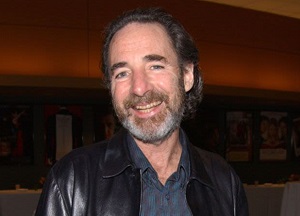
Harry Shearer (Los Angeles, 23 december 1943)
De Franse dichter, schrijver en criticus Charles Augustin Sainte-Beuve werd geboren op 23 december 1804 in Boulogne-sur-Mer. Zie ook alle tags voor Charles Sainte-Beuve op dit blog.
Uit: Molière
« Il y a en poésie, en littérature, une classe d’hommes hors de ligne, même entre les premiers, très-peu nombreuse, cinq ou six en tout, peut-être, depuis le commencement, et dont le caractère est l’universalité, l’humanité éternelle intimement mêlée à la peinture des mœurs ou des passions d’une époque. Génies faciles, forts et féconds, leurs principaux traits sont dans ce mélange de fertilité, de fermeté et de franchise ; c’est la science et la richesse du fonds, une vraie indifférence sur l’emploi des moyens et des genres convenus, tout cadre, tout point de départ leur étant bon pour entrer en matière ; c’est une production active, multipliée à travers les obstacles, et la plénitude de l’art fréquemment obtenue sans les appareils trop lents et les artifices. Dans le passé grec, après la grande figure d’Homère, qui ouvre glorieusement cette famille et qui nous donne le génie primitif de la plus belle portion de l’humanité, on est embarrassé de savoir qui y rattacher encore. Sophocle, tout fécond qu’il semble avoir été, tout humain qu’il se montra dans l’expression harmonieuse des sentiments et des douleurs, Sophocle demeure si parfait de contours, si sacré, pour ainsi dire, de forme et d’attitude, qu’on ne peut guère le déplacer en idée de son piédestal purement grec. Les fameux comiques nous manquent, et l’on n’a que le nom de Ménandre, qui fut peut-être le plus parfait dans la famille des génies dont nous parlons ; car chez Aristophane la fantaisie merveilleuse, si athénienne, si charmante, nuit pourtant à l’universalité. À Rome je ne vois à y ranger que Plaute, Plaute mal apprécié encore, peintre profond et divers, directeur de troupe, acteur et auteur, comme Shakspeare et comme Molière, dont il faut le compter pour un des plus légitimes ancêtres. Mais la littérature latine fut trop directement importée, trop artificielle dès l’abord et apprise des Grecs, pour admettre beaucoup de ces libres génies. Les plus féconds des grands écrivains de cette littérature en sont aussi les plus littérateurs et rimeurs dans l’âme, Ovide et Cicéron. Au reste, à elle l’honneur d’avoir produit les deux plus admirables poëteC’est aux temps modernes et à la renaissance qu’il faut demander les autres hommes que nous cherchons : Shakspeare, Cervantes, Rabelais, Molière, et deux ou trois depuis, à des rangs inégaux, les voilà tous ; on les peut caractériser par les ressemblances. Ces hommes ont des destinées diverses, traversées ; ils souffrent, ils combattent, ils aiment. Soldats, médecins, comédiens, captifs, ils ont peine à vivre ; ils subissent la misère, les passions, les tracas, la gêne des entreprises. Mais leur génie surmonte les liens, et, sans se ressentir des étroitesses de la lutte, il garde le collier franc, les coudées franches. Vous avez vu de ces beautés vraies et naturelles qui éclatent et se font jour du milieu de la misère, de l’air malsain, de la vie chétive ; vous avez, bien que rarement, rencontré de ces admirables filles du peuple, qui vous apparaissent formées et éclairées on ne sait d’où, avec une haute perfection de l’ensemble, et dont l’ongle même est élégant : elles empêchent de périr l’idée de cette noble race humaine, image des Dieux. s des littératures d’imitation, d’étude et de goût, ces types châtiés et achevés, Virgile, Horace! »
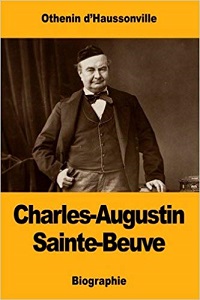
Charles Sainte-Beuve (23 december 1804 – 13 oktober 1869)
Cover biografie
De Duitse dichteres en schrijfster Mathilde Wesendonck werd geboren als Agnes Luckemeyer op 23 december 1828 in Elberfeld. Zie ook alle tags voor Mathilde Wesendonck op dit blog.
An Guido
I.
Ruhe holder Knabe,
Ruhe sanft und lind
Nun im frühen Grabe,
Du mein liebes Kind!
Weiß dich da geborgen
Vor der Erde Noth;
Schützet uns vor Sorgen
Einzig doch der Tod!
Rinnen meine Thränen
Noch so heiß herab,
Glücklich muß ich wähnen
Dich im kühlen Grab.
Ob das Herz in Bangen
Nach dem Liebling ruft,
Schweiget sein Verlangen
Vor der stillen Gruft.
Möchte nimmer stören
Deine süße Ruh’;
Leiden abzuwehren,
Schlafe, Liebling, du!
Schlafe – laß mich weinen,
Weinen lang und schwer,
Du, in süßen Träumen,
Hörst es ja nicht mehr!
Schwebe, Engel, schwebe
Leuchtend himmelan,
Wie die Sterne webe
Deine lichte Bahn;
Hebe dich zur Sonne,
Tauch in Aether’s Blau,
Unermeßne Wonne
Kränze deine Brau’.
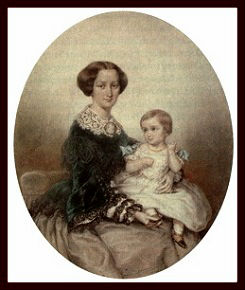
Mathilde Wesendonck (23 december 1828 – 31 augustus 1902)
Portret door Ernst Benedikt Kietz van Mathilde met haar zoontje Guido, 1856
De Duitse dichter Martin Opitz von Boberfeld werd geboren op 23 december 1597 in Bunzlau (Silezië). Zie ook alle tags voor Martin Opitz op dit blog.
Sonnet XII
Wann ich mit frieden kan in deinen Armen liegen /
So hab’ ich schon genung: mehr ehre wüntsch’ ich nicht
Auff dieser weiten Welt/ als dir/ mein Trost vnd Liecht/
In deiner weissen Schoß zu ruhen nach genügen.
Diß ist mein bester zweck: es mag ein andrer kriegen
Dem Mars im Hertzen steckt das aus jhm selber bricht /
Nach Helm’ vnd Waffen greifft/ den kühnen Feind bespricht
Vnd wanckt nicht vmb ein Haar/ wil sterben oder siegen.
So wilde bin ich nicht: Dorinde/ wann du dich
Vmb meine Schuldern wirffst das ist ein krieg für mich;
Hiervon soll meinen Sinn kein Ruhm vnd Gut bewegen.
Das Glücke deiner Gunst hat bey mir grössern schein
Als etwan Cesar selbst vnd Alexander seyn/
Vnd diese gantze Welt zun Füssen können legen.
Martin Opitz (23 december 1597 – 20 augustus 1639)
Bunzlau (Nu: Bolesławiec) in de kersttijd

